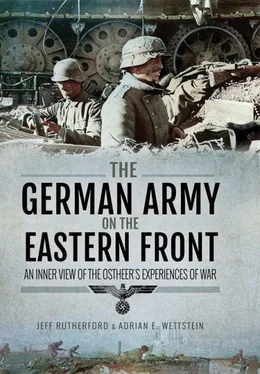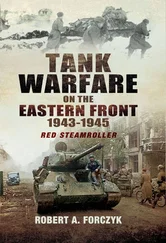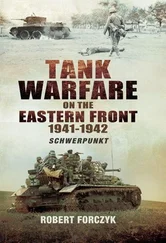For the division, there will unfortunately still not be the hoped for quiet that the troops so deserved after the difficult fighting on the offensive. Heavy enemy forces are on the northern flank of the deeply advanced IIIrd Panzer Corps and threaten the already won Rostov. Therefore new heavy fighting is imminent.
Within eight days, the situation had degenerated into one that the division viewed as critical:
29.11.41: This day was the most difficult for the division in the entire war against Russia. The situation is extremely critical because
1) the troops are completely exhausted, as they have been given no break since the beginning of the offensive against Rostov on 17.11. The men have been continually in the tremendous cold, almost exclusively in the open, partially without winter clothes and warm food,
2) the vehicle situation no longer allows for any large-scale movements for eventual counter-thrusts,
3) the individual battalions are so weakened through losses, that no reserves can be formed,
4) the high losses in weapons and equipment have considerably weakened the combat power,
5) the enemy continually introduces new forces and attacks in mass.
The 14th Panzer Division’s complaints regarding the effects of weather on the troops and the scarcity of operational vehicles were echoed by other mechanized units. Far to the north in the Volkhov River area, the 10th Panzer Regiment – the primary armoured component of 8th Panzer Division – submitted a report detailing the unit’s deficiencies. [21]
To the 8th Panzer Division Ia.,
On 7.12.41, I submitted a report about the possibility or impracticality of refreshing the regiment for wide-ranging movements under the prevailing weather conditions in the east. After taking a look at the yet again concentrated battalions of the regiment, I once more report that a refreshing and restoration of the regiment’s combat readiness, which is necessary for wide-ranging movements, is not possible due to shelter and weather conditions in this region. The regiment’s equipment, especially the tanks, suffers so severely due to the cold that new equipment and equipment that has been recently repaired in the Heimat breaks down very quickly with great damage. It is a known fact that all metal-pieces lose their elasticity due to the strong effects of the cold and often break like glass, without being caused by intense stress. A temporary storage and shutting down of the equipment is not possible, as training and supply runs must be carried out. The bringing-up of the spare parts from Minsk would by itself strain to an intolerable extent all vehicles dedicated to this task. The experiences of the previous winter in Neuhammer and the refreshing in Bohemia have revealed that the number of trips far and away surpass the previously set number. I don’t believe that the workshop is in the condition to do any of the essential things for the new revitalization, outside of the continual repairs that continually crop up due to the effects of the cold and snow. Even with its extensive experiences, it has already practically reached its capacity for vehicles that require repair. As already pointed out in the report from 7.12.41, combat strength is in the first place based upon a well-trained officer corps and properly trained crews. Due to the heavy casualties of the eastern campaign, which have amounted to 14 company commanders alone, such gaps have occurred that filling them with replacements trained in the Heimat is only possible numerically. One can no longer speak of this unit having a substantial combat strength. The regiment must be newly trained from the ground up. This must begin with the training of new drivers, the familiarizing of the crews with one another and their tasks, the schooling of commanders and radio operators; furthermore, the binding together of the companies to combat units through closely monitored training exercises and familiarizing each battalion’s members with one another is absolutely necessary. Furthermore, new technical personnel must be trained; a large number of specialists (tank mechanics, tank radio repairmen, truck mechanics, etc.) are missing. One cannot master these tasks in snow and ice or filth and mud. For this purpose, one requires terrain and weather conditions that allow for it. Three full months is the minimum period of time required for this training. It should not be interrupted by periods of leave or else its success will be called into question. To this end, a barracks-like stay is again necessary so that through inner service, discipline can be solidified and renewed. The billeting must allow for the possibility of classroom instruction for platoons and companies. All of this is not possible in the local horse shanties.
I maintain that the refreshing and reestablishment of the regiment’s combat readiness in material and personnel in the already cited period of time of 3 months is only possible in an area that permits an intensive training of personnel and the total work of the workshop and repair services during the entire time.
Only under these conditions will it be possible for the regiment to restore the old striking-power that it had on 22.6.41.
From the perspective of the regimental commander, Operation Barbarossa had shattered his unit’s combat power in two ways. First, the deleterious effects of casualties – especially at the leadership level – resulted in tank crews who were neither well led nor well trained, an issue discussed in more detail in chapter 6. Second, the constant combat and the inability to pull the unit out of the line for a necessary period of maintenance resulted in a vehicle park that possessed fewer operational vehicles by the day. Finally, the effects of the Russian winter only exacerbated the problems faced by the unit, as the lack of suitable shelter made it impossible to restore the unit’s combat efficiency. His admission that the unit could no longer be compared to that which had invaded the Soviet Union on 22 June 1941 was one that could be extrapolated to the army as a whole. During the fighting of 1941, the German army that entered the conflict was transformed by the ferocious combat that it engaged in with the Red Army. When it finally emerged from the subsequent winter crisis in spring 1942, it was a much-changed force in terms of quality of leadership, material, and its relationship to the political authorities.
The Soviet offensive that erupted across the breadth of the front during the winter of 1941–42 forced the German army as a whole onto the defensive. The crisis this caused within the army is well-known; in addition to the cashiering of numerous Army Group, Army, and Panzer Group commanders and Hitler’s taking control of the army by replacing Generaloberst Walther von Brauchitsch as Commander-in-Chief of the army, Hitler also issued his famous ‘Halt order’ on 16 December. [22]This order was disseminated by VIIth Army Corps on 3 January 1942 to its subordinate units informing them of the necessity of standing and fighting in place. [23]
2) Since there is not a rear area position, large sections of troops are not mobile due to a shortage of vehicles and fuel, and large areas behind the present front are not passable, every retreat means the loss of heavy equipment and sooner or later certain annihilation, quite apart from the operational and psychological consequences….
3) Thus, I order the following for the conduct of war:
a) the present lines are to be held and constructed as winter positions. Without exception, all occupied villages are without any consideration of the inhabitants to be established as strongpoints and are to be given up under no circumstances whether or not the garrisons expect to be bypassed.
Necessary improvements of positions are to be undertaken forward if possible. Every operational withdrawal is subject to my personal authorization.
Читать дальше






![John Stieber - Against the Odds - Survival on the Russian Front 1944-1945 [2nd Edition]](/books/405234/john-stieber-against-the-odds-survival-on-the-russian-front-1944-1945-2nd-edition-thumb.webp)





